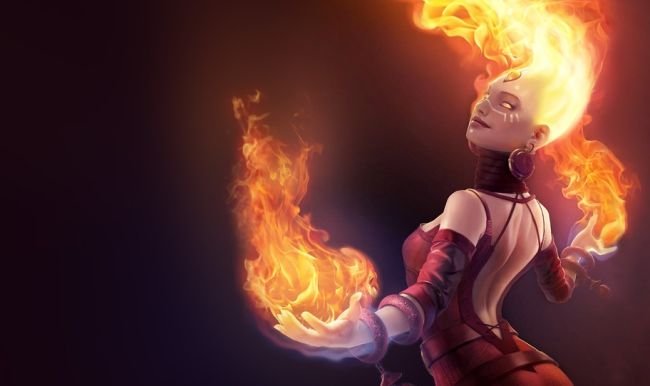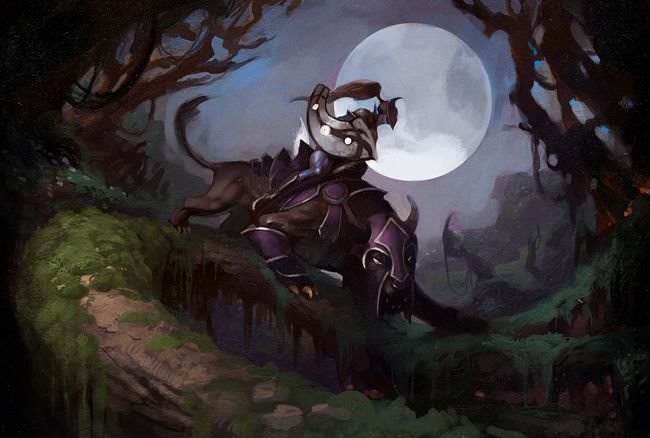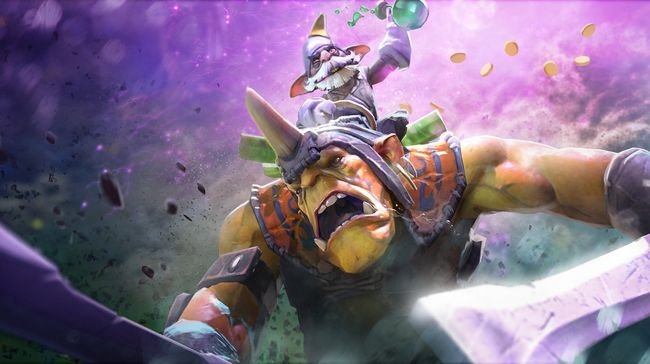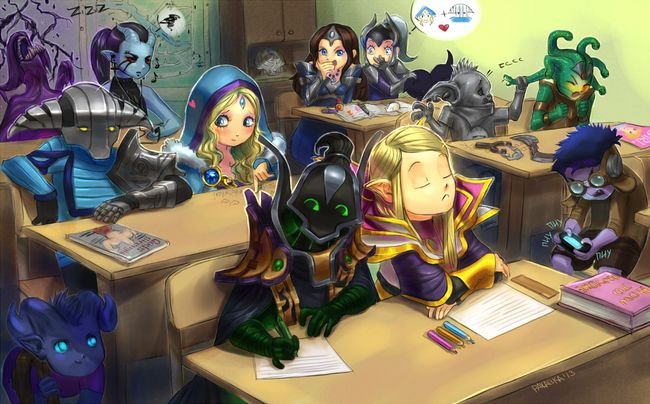If you've always been curious about Dota 2 but never taken that first step, then now is the perfect time. The biggest event in the Dota calendar, the International, is only weeks away. Start today and you'll be in a great position to enjoy the event, and the event itself is one of the best ways to deepen your appreciation for the game. My relationship with Dota 2 began right before TI2 in 2012, and contrasting my nascent understanding of the game with the quality of play at that tournament—including 'The Play', one of the most celebrated moments in pro Dota—sparked a four year commitment spanning thousands of hours of play.
This is my favourite game—possibly my favourite game ever—and I would never have assumed that it was for me before I tried it. I've written almost a hundred thousand words about the game over the last couple of years, but in this article I'm going to dial it back to the start. If you've not played Dota 2, why should you? What do you need to invest? And where can you look for further help?

What is Dota 2, really?
Let's put aside the word 'MOBA' for a moment, because it doesn't help. Dota 2 is a multiplayer game that draws in elements from strategy games, RPGs, and competitive action. Although your objective is simple—kill AI minions, gain power, destroy your opponent's outer defenses, and siege their base—Dota's appeal lies in its breadth.
There comes a point with most competitive games where you've seen more or less everything. You've fired every gun, captured every objective. Though the details may differ, eventually matches begin to run into one another.
This doesn't happen with Dota 2. You play as one of more than a hundred distinct characters, as do all of your teammates and every member of the enemy team. Between the ten heroes present in any given game there are dozens of special abilities, rules, counters, and interactions. This is further complicated by items—hundreds of bolt-on upgrades for your hero that grant new skills and bonuses. Every character and item has, in turn, a differing relationship with the map—the eleventh character in the match, a labyrinth of pathways, neutral monsters, buffs, and so on. And all of the above stems from a deep and internally-consistent stat system.
Dota 2 is notably complex even when compared to its closest peers: games like League of Legends, Smite, and Heroes of the Storm. It was the result of years of community development before it was taken under Valve's wing, and as a result it's packed with special rules and exceptions and mechanics that feel like hacks. It's far from elegant, but you'll never stop being surprised by it. A single tree in Dota 2 has more special rules attached to it than some Heroes of the Storm maps.

What do I get out of playing?
If you're fascinated by systems, competition, and teamplay, then Dota 2 has unsurpassed depth and longevity (and honestly, I'm surprised you don't play it already.) This is a game for people who want to commit to something, who are excited rather than repelled by the idea of climbing a mountain. It helps a great deal if the idea of learning excites you.
It's not all work, however. Dota 2's complexity makes it a brilliant generator of anecdotes, and sharing these moments with friends is a pleasure independent of the game's difficulty. Similarly, fluency with the game gives you access to an esports scene with decades of history and a community that, in its brighest moments, feels like a massive exclusive club for people who 'get' Dota.
Also: Dota 2 is fun. That helps too.

What do I need ?
In terms of financial outlay, Dota 2 is remarkably generous. The entire game including every character, item and ability is entirely free. You can play at the highest level immediately without spending a penny. The in-game store is limited to cosmetic items and seasonal 'Battle Passes', which amount to minigames and cosmetic collections tied to specific esports events. It's possible to spend a lot of money on Dota 2 in that regard, and if you want the rarest and flashiest cosmetics then you'll certainly need to spend for them—but you don't need to.
Minimum System Requirements
OS: Windows, OS X, Linux
Processor: Intel dual core/AMD at 2.8Ghz+
Memory: 4Gb RAM
GPU: nVidia GeForce 8600, ATI/AMD Radeon HD2600
Storage: 15.5Gb
In terms of time, Dota 2 is trickier to assess. The road to understanding is extremely long, and you need to be okay with the idea that thousands of hours of experience will make you an intermediate player at best. Mastery takes decades. There's also the matter that there's no way to surrender a match in progress, and leaving early carries a punishment. You can't play Dota 2 unless you're willing to give it 45 minutes to an hour at a time.
On the other hand, Dota 2 has no grinding and, while it does have account levels, these don't have anything to do with your in-game capabilities. Everything you can do in Dota 2, you can do from the moment you load the game. Your skill is gated by your own ability, not by an unlock system.
You will certainly need patience. Not just patience for learning, but patience with a community which, at its worst, can be one of the most hostile in gaming. Toxicity is Dota 2's most serious problem, and arguably a bigger barrier to entry than the learning curve. To an extent, this is not the game or Valve's fault. There are in-game reporting tools and punishments for repeat offenders. The issue is simply that the game attracts players with a certain attitude—ready to rage at their teammates, ready to say anything to get a rise out of their opponents, willing to make people uncomfortable for its own sake. Play game for any length of time and it is sadly inevitable that you will encounter racism, sexism, prejudice and hostility.
This isn't everyone, however. Dota 2 is able to forge positive bonds between people, too, and it's much more fun to learn if you make the journey with people you enjoy making friends with. You'll make friends playing Dota 2, but you'll need to develop a thick skin on the way.

The best resources for beginners
Over the years, the Dota 2 community has fostered some amazing teachers who make the journey a lot easier. When you begin, you'll want to start by playing against bots with a selection of guides and videos to hand. Only when you feel like you've got a grasp of all of the different factors that go into a victory should you step into the game proper.
Kevin 'Purge' Godec has a longstanding reputation as one of the best tutors in the scene and his beginner's guide, 'Welcome To Dota, You Suck' is a great place to start. His YouTube channel, PurgeGamers, is also helpful. When you're ready to start learning each new hero, check to see if there's a relevant 'Purge plays' video and watch at least the first ten minutes to get a sense of the character's role and item progression. Mind the time and date stamp, however: Dota 2 changes a lot from patch to patch, so information in older videos might lead you astray if you're not careful.
Other great beginner's guides include devilesk's 'Comprehensive Dota 2 Guide' and Flipside3Tactics' YouTube series, 'Dota for Dummies'. Finally, the Dota 2 guides section in the Steam Community is a useful resource of hero-specific builds that can be loaded in-game using the book icon in the top left. Again, look for guides designed for the current patch and use the star rating associated with each to guide you.
Get into the pro scene
This is a very, very good time to start watching professional Dota 2. The International is the biggest event of the year, and boasts the largest prize pool in competitive gaming. The Dota 2 scene is diverse and competitive, with no single dominant team or region.
The best places to watch professional Dota 2 are on Twitch and via in-game spectator tools. Click the 'Watch' tab to see games in progress, which includes professional play as well as pub games taking place around the world. Once you're in, you can control the camera yourself or give over control to a particular commentary crew using the in-game menus. If you own a Vive, you can also spectate in virtual reality using the incredible Dota VR Hub.
While watching pro play is a great way to learn the game, it certainly helps if you already know the basics. Following some of the guides above and getting a couple of bot games under your belt is the way to go if you want to be able to follow the competition.
Beautiful post
Very interesting